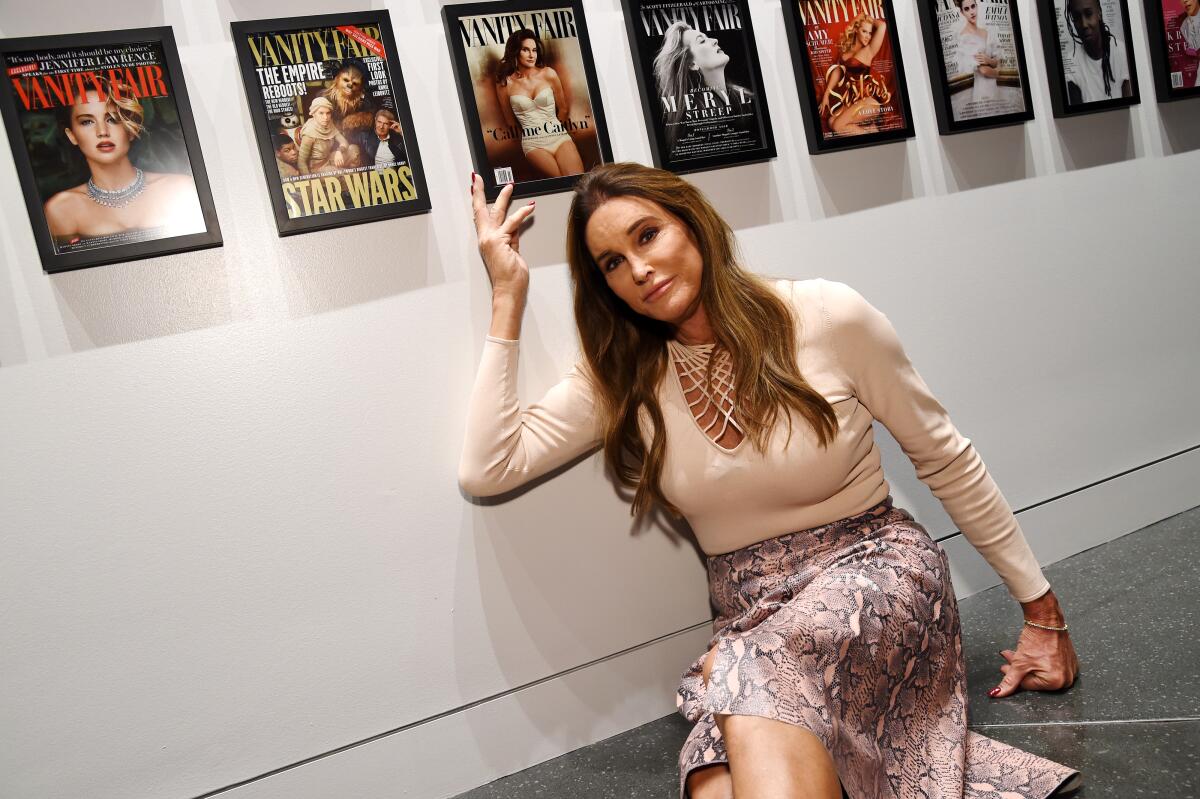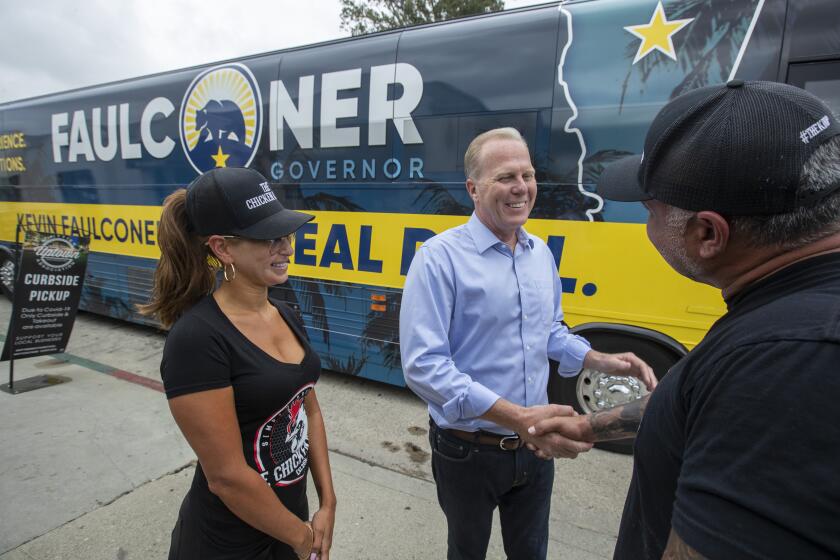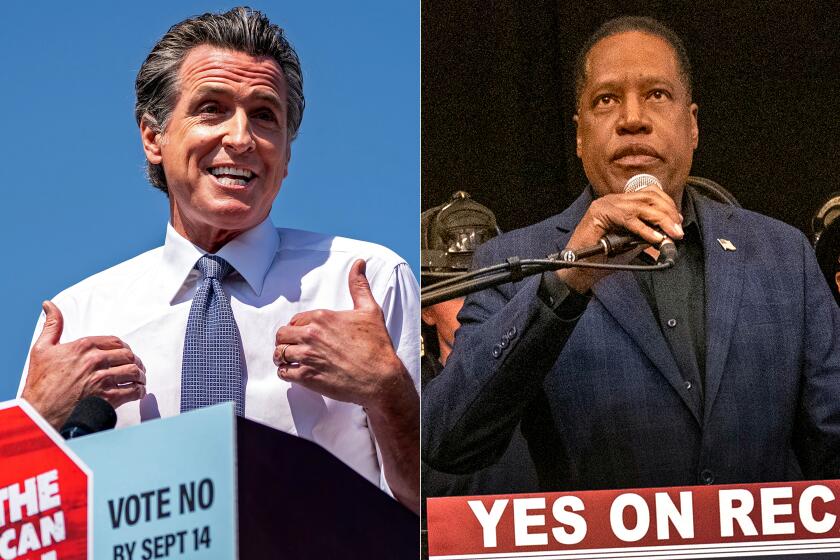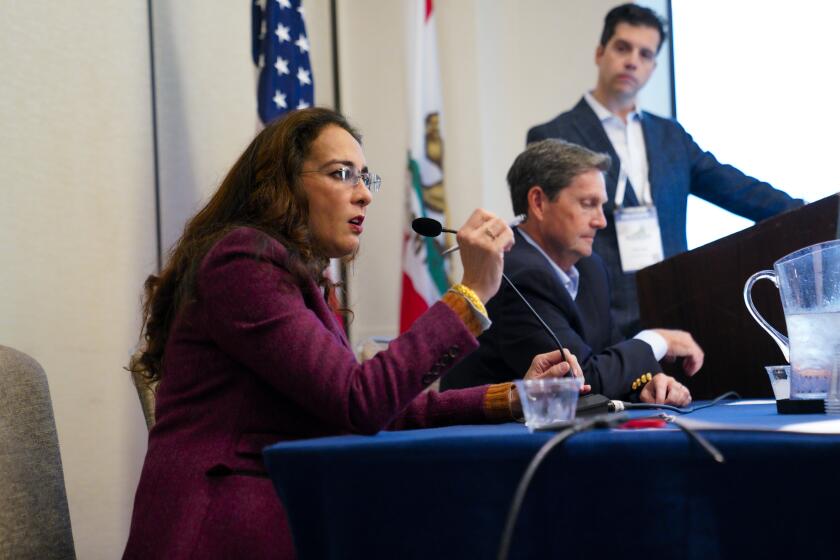‘More Gary Coleman than Arnold Schwarzenegger’: Caitlyn Jenner’s historic run struggles

- Share via
When Caitlyn Jenner launched her bid for governor in late April, the Olympic Gold medal-winning decathlete and reality television star’s website had just two options: “Shop” and “Donate.”
The gubernatorial candidate wouldn’t stake out her first policy position until a week later, when a camera-wielding paparazzo in the parking lot of an upscale Malibu strip mall asked Jenner for her opinion on legislation in various states that would ban transgender girls from playing girls’ sports in school.
The most prominent transgender candidate in American political history paused to shepherd her dog Baxter into her Cadillac Escalade, turned back to the camera and said she opposed “biological boys who are trans competing in girls’ sports in school.” Jenner’s position put her in diametric opposition to LGBTQ advocacy groups around the country, who have been battling a record number of anti-trans bills pushed by conservatives in more than 30 states.
“It would be comical if it weren’t so dangerous,” said Samuel Garrett-Pate — a spokesperson for Equality California, the nation’s largest statewide LGBTQ+ civil rights organization, speaking in reference to Jenner taking that position.
Veteran GOP strategist and Lincoln Project co-founder Mike Madrid characterized Jenner’s candidacy as “more Gary Coleman than Arnold Schwarzenegger,” saying the campaign appeared to lack any obvious strategy or rationale.
When Jenner threw her hat in the recall ring, some thought her history-making candidacy could be a game changer, or at least spark excitement in the race. She opened her campaign with multiple primetime national media interviews, a position in one of the most famous families in the world and more than 16 million social media followers across platforms.
As a longtime registered Republican, Jenner’s party affiliation would certainly make for an uphill battle in sapphire-blue California. But some of her early positions — such as lower taxes, criticism of COVID-19 closures and strong support for former President Trump’s border wall — seemed like they could strike a chord on the right.
It has not worked out that way. California Republicans have yet to flock to her. And Jenner’s identity as a transgender woman has cut both ways for her campaign. Many in the LGBTQ community write her off because of her conservative politics, while she recently faced transphobic attacks from the right.
At the Conservative Political Action Conference in mid-July, a heckler repeatedly called Jenner “Bruce” and referred to her as a “sick freak” in a video later posted on Twitter. “Deadnaming,” or referring to someone by their pre-transition name, can be a form of harassment and can cause the target emotional distress.
“Why do we want a picture with a t—? We’re supposed to be conservatives,” the heckler said, using a transphobic slur just before the end of the video. Rep. Marjorie Taylor Greene (R-Georgia) misgendered Jenner shortly after the CPAC incident, referring to the candidate as a “man in a dress” in a tweet posted Monday.
In an emailed statement, Jenner said she had a great experience at CPAC and wasn’t aware of the incident until days later. “I think it’s important that the Republican Party has an opportunity to expand its base and I hope I can be a part of that,” she said.
Jenner — who has often said it was easier for her to come out as transgender than come out as a Republican — is running under the banner of a party that has championed anti-transgender legislation for years. And despite her role as one of the world’s most visible transgender women, no major LGBTQ organization has endorsed Jenner and several have even spoken out against her candidacy.
In a state as blue as this one— where registered Democrats outnumber registered Republicans nearly 2-to-1 and a member of the GOP hasn’t won statewide office since 2006 — a conservative candidate looking to conquer modern California needs true crossover appeal to even think about success. But Jenner has yet to gain a discernible foothold with the California electorate.
When Jenner was asked to describe her political base in a Times interview earlier this year, she said she appealed “to so many people.”
In an emailed statement sent Thursday, Jenner described her base as “Californians who are sick and tired of Gavin Newsom leading this state off a cliff.” Capitalizing on anger at Newsom will be key to any replacement candidate’s success, but the first months of her campaign have shown Jenner to lack any clear political lane.
A poll conducted in late April and early May found Jenner in fourth place among Republicans, trailing three candidates whom many Californians would be hard-pressed to name.
“She wants to stay relevant by any means, regardless of the cost to a community,” TransLatin@ Coalition Vice President Maria Roman-Taylorson said. “The sad thing is that Caitlyn Jenner had the opportunity as a visible trans person to really change the landscape, or the narrative against our people, and she chose to go the opposite way.”
Almost exactly six years to the day before Jenner’s Malibu TMZ encounter, nearly 17 million people watched as Jenner told Diane Sawyer that she was transitioning from male to female.
That 2015 interview — broadcast within months of People naming actress and activist Laverne Cox as one of their “Most Beautiful Women” and TLC premiering a reality show about a transgender teen in Florida — was a watershed moment during a watershed year for mainstream transgender visibility in the U.S.
When the Olympic icon and reality television star shared her truth on national TV, she became the first transgender person that many Americans “knew.”
Mainstream transgender and nonbinary visibility has increased exponentially in the half-decade or so since Jenner’s very public transition. While the trans community, particularly trans people of color, still face disproportionate levels of violence, research shows that Americans have become more supportive of transgender rights in recent years. The number of Americans who know someone who is transgender has also dramatically increased.
“You can definitely credit her for being part of that,” Patrick R. Miller, an associate professor of political science at the University of Kansas who studies political behavior and transgender issues in politics, said of Jenner.
But that increasing mainstream visibility has also been galvanized, at least in part, by a long wave of attacks on transgender civil rights, from the 2016 passage of North Carolina’s now-repealed “bathroom bill” to this year’s record number of conservative-led anti-trans bills in statehouses around the country. Amid a broader period of hyper-partisanship in American politics, transgender rights have also become an increasingly partisan topic.
As Miller explained, back in 2015, a lot more Americans didn’t have an opinion on transgender issues one way or the other. Generally speaking, Democrats have become more supportive and Republicans more antagonistic in the years since. As several experts explained, issues of transgender rights — particularly legislation targeting transgender youth — have become a wedge issue in American politics in recent years, animating the conservative base even as they remain a relatively low priority for most voters.
Logan Casey, a political scientist who tracks transgender candidates, cites those legislative attacks as of one of several factors that have motivated a growing number of transgender candidates to run for office over the last six years. The November 2020 election ushered in a record number of victories for trans and nonbinary candidates in both red and blue states.
“We are being successfully elected in communities all across the country,” Casey said, citing Trump-era anti-trans policies and general visibility as other factors contributing to the rising number of candidates. While transgender Republicans certainly do run for office, the researcher characterized “the majority, if not the vast majority” of the candidates he tracks as being Democrats or members of other liberal parties.
Like any other demographic group, transgender Americans are far from monolithic. Research Casey cited from the 2018 Cooperative Election Study shows that when independents who lean one way or the other are included, about 25% of transgender Americans identify as Republicans. But it’s not always an easy position to occupy.
Gina Roberts — a San Diego-area woman who serves on a local fire protection district board — is thought to be the only transgender Republican currently holding elected office in California.
“If you look at Caitlyn’s story and my story ... if you changed the names and the level of accomplishment, it’s pretty much the same story,” she said. Roberts transitioned at 57, publicly presented as a testosterone-driven “man’s man” earlier in life and used to cross-dress while traveling the country on business trips. Both have also experienced the tightrope act of navigating politics as a transgender Republican.
After many years of being “the token Republican in the crowd” in LGBTQ advocacy spaces, Roberts said she’s come to feel less welcome there over the last decade. On the other side of the aisle, she said there were “about a dozen people that I deal with in the Republican party that really would just as soon I not be breathing.” But she characterized those “extremists” as a tiny segment of the overall party.
Elliot Imse, a spokesperson for the LGBTQ Victory Fund, a bipartisan organization that tracks and supports LGBTQ candidates, said the overall number of LGBTQ Republican candidates running has dwindled over the past few years. “The reality is that the Republican primaries in most parts of the country have become exceedingly difficult for LGBTQ candidates to become successful because of vociferous, anti-LGBTQ animus among many in the Republican political base,” he explained.
A gubernatorial recall candidate obviously won’t have to contend with a Republican primary, but Republican candidates are fighting for pieces of the state’s already limited Republican electorate. Imse and other LGBTQ advocates also spoke harshly about Jenner’s prior embrace of former President Trump, whose administration fought to roll back transgender civil rights protections.
Trump remains deeply unpopular with a broad majority of California voters and Jenner’s public seesawing on the former president once again places her in a kind of political no-man’s land — her 2018 public condemnation is likely to have alienated Trump loyalists, while her current positioning probably remains too close to the former president to curry favor with anti-Trump Californians.
Other Jenner proposals have also drawn ire, including a recent suggestion that people experiencing homelessness be relocated to “big open fields.” Ashlee Marie Preston, a transgender activist and writer who was formerly homeless, said Jenner’s comments on homelessness and Trump’s border wall felt like “dog whistle slogans that completely go against everything that Californians stand for.”
Ultimately, the success or failure of Jenner as a candidate may have little to do with her gender. California currently has more transgender, gender nonconforming and nonbinary elected officials than any other state, according to a Victory Institute analysis. Madrid, the GOP strategist, said he even thought today’s California Republican party — which elected Gina Roberts to a local party leadership position several years ago — could be willing to accept a transgender candidate. But, Madrid continued, “you also have to have some sort of rationale for the candidacy.”
Jenner appears undaunted by the poll numbers or critiques.
“Far too often those in media and others have tried to put me into this box they feel represents all Republicans,” Jenner wrote in her emailed statement. “In reality, we are a diverse party, especially in California.”
More to Read
Sign up for Essential California
The most important California stories and recommendations in your inbox every morning.
You may occasionally receive promotional content from the Los Angeles Times.










